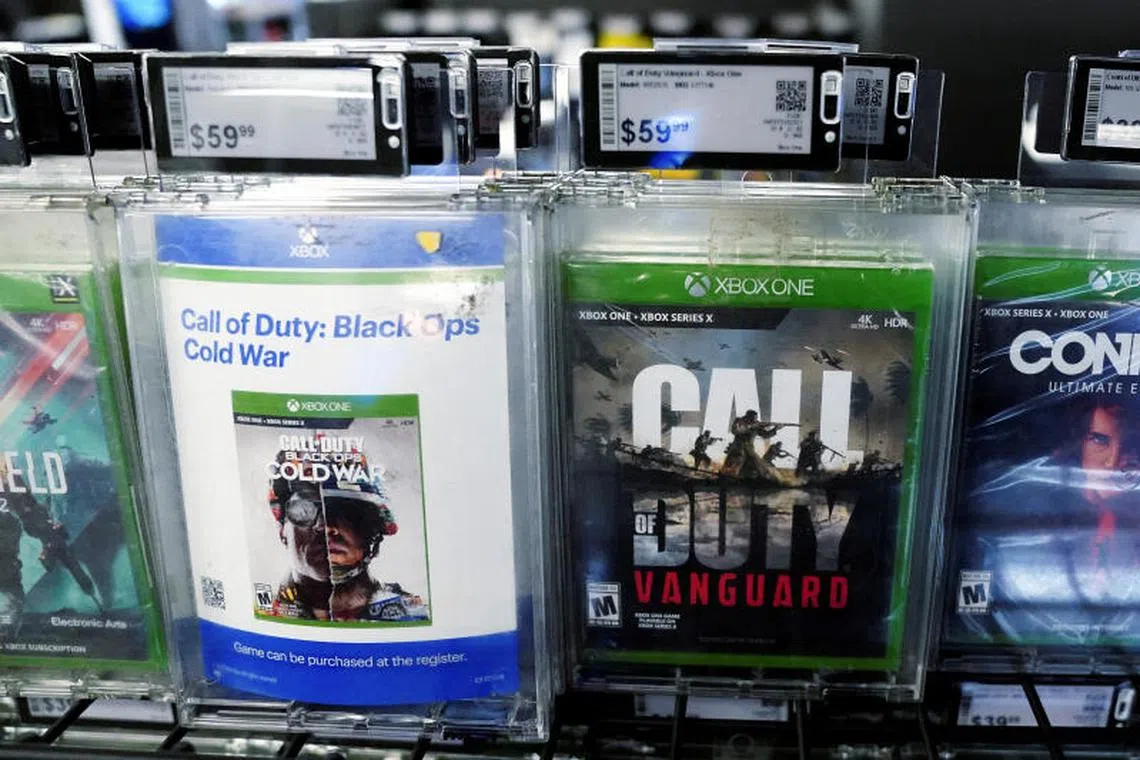Microsoft to offer Call Of Duty on Nintendo devices if Activision deal closes
Sign up now: Get ST's newsletters delivered to your inbox

Microsoft also announced a 10-year commitment to release Call of Duty with Valve, the maker of the Steam distribution platform.
PHOTO: REUTERS
SEATTLE – In a last-minute attempt to placate antitrust regulators, Microsoft said on Tuesday that it will bring the blockbuster video game franchise Call Of Duty to Nintendo devices if its US$69 billion (S$94 billion) acquisition of the game’s maker, Activision Blizzard,
Microsoft’s deal to buy Activision faces reviews by antitrust regulators around the globe.
Many in the video-game industry expect the United States Federal Trade Commission to discuss the acquisition in a closed-door session scheduled for Thursday. The commission could vote on whether to file a lawsuit in an effort to block the deal.
Regulators are primarily focused on concerns that consumers would be harmed if Microsoft, which makes the Xbox console, withheld Activision’s games from competitors or unfairly leveraged Activision’s popular titles as more video games were streamed online.
The 10-year deal to bring future releases of Call Of Duty to Switch video-game devices made by Nintendo, one of Microsoft’s rivals, is part of Microsoft’s efforts to signal that it would not block the popular game from devices made by other companies.
Microsoft also announced a 10-year commitment to release Call Of Duty with Valve, the maker of the Steam distribution platform, which is popular with gamers who play on personal computers rather than game consoles. Call Of Duty’s latest release is already available on Steam.
Call Of Duty is also a key video game for Sony’s PlayStation console, and Microsoft has offered to maintain that relationship for at least another 10 years if the Activision deal goes through. Sony declined to comment on Microsoft’s offer after it was made. Sony has objected to Microsoft’s acquisition of Activision, arguing that it would reduce choices for gamers.
A long-running franchise in which players fight in historical, present-day and futuristic battles, Call Of Duty is a crown jewel in Activision’s portfolio. It has earned more than US$30 billion in revenue. The latest version, Modern Warfare II, made more than US$1 billion in just 10 days.
For Nintendo, adding a violent first-person shooter game like Call Of Duty to the host of titles available to play on the Switch would be a surprising departure. The company has long been protective of the playful, family friendly branding it has developed over decades through iconic franchises such as Mario, Pokemon and The Legend Of Zelda, although it does offer some more mature games.
Sony and Microsoft have sparred often over a similar segment of so-called hardcore gamers, who might be more drawn to dark, story-driven games or challenging and violent combat games.
But Nintendo has built an empire marketing lovable, candy-coloured characters, like the squishy pink Kirby and the smiling dinosaur Yoshi. At the beginning of the Covid-19 pandemic, Animal Crossing: New Horizons, a tranquil game in which players build virtual islands, became a smash hit.
Nintendo’s newest console, the Switch, is significantly cheaper than Sony’s PlayStation 5 or Microsoft’s Xbox Series X, and differs from the more expensive, boxier consoles by being small and portable, so players can game on the go.
The Switch has been a huge success, selling 114 million units as at the end of September. But it has less processing power than the newest Microsoft and Sony consoles, raising questions about what kind of an experience playing Call Of Duty would be on a Nintendo device.
“Nintendo has done a great job of creating a family friendly platform that can be successful for all kinds of creators,” Mr Phil Spencer, the chief executive of Microsoft’s gaming business, said in an interview, adding that there is “definitely work” to be done to make Call Of Duty run well on the Switch.
Gaming has become Microsoft’s most important consumer business, and when it announced the Activision acquisition in January it signalled that getting approval from antitrust regulators could be cumbersome.
Microsoft said closing the deal could take a year and a half, and has agreed to pay Activision as much as US$3 billion if the tie-up falls apart. NYTIMES


